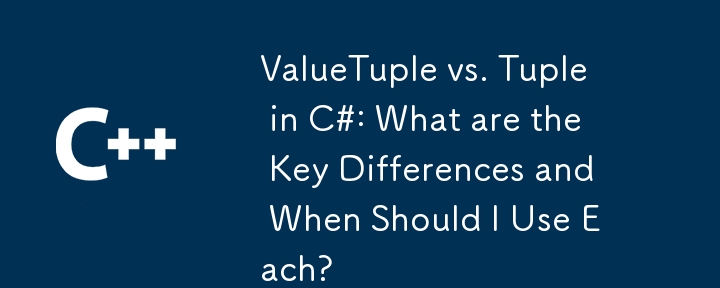

Deciphering the Differences Between System.ValueTuple and System.Tuple
In the realm of C#, tuples have emerged as a powerful tool for encapsulating multiple values of varying types. While both System.Tuple and System.ValueTuple serve this purpose, there are distinct differences between the two that warrant consideration.
Nature and Memory Management
The most fundamental difference lies in their underlying implementation. System.Tuple is a reference type (class), while System.ValueTuple is a value type (struct). This distinction has significant implications for memory management. Reference types are allocated on the managed heap by the garbage collector (GC), whereas value types reside on the stack and are managed directly by the application. As a result, System.ValueTuple avoids the overhead of allocation and GC pressure.
Mutability
Another notable distinction arises in the context of mutability. System.Tuple, being a class, is an immutable object, meaning its state cannot be modified after creation. In contrast, System.ValueTuple is a mutable struct, allowing its fields to be directly modified. However, caution should be exercised when utilizing this feature, as it can lead to unexpected behavior, particularly when used as a field within a class.
Accessing Member Values
Access to member values also differs between the two types. System.Tuple exposes its items via properties (Item1, Item2, etc.), while System.ValueTuple uses direct field access. Field access is typically faster than property access, providing a slight performance advantage for ValueTuple.
Syntax Sugar and Decomposing
One of the key advantages of C# 7 tuples emerged with the introduction of syntax sugar, making them easier to work with. While System.Tuple requires explicit naming of individual item members, ValueTuple allows for named fields and effortless decomposition into individual variables. This enhanced syntax eliminates the need for cumbersome Item1, Item2 notation.
Example
To illustrate the practical differences, consider the following example that calculates the sum and count of values in a list:
// Using System.Tuple
public Tuple<int, int> DoStuff(IEnumerable<int> values)
{
var sum = 0;
var count = 0;
foreach (var value in values)
{
sum += value;
count++;
}
return new Tuple<int, int>(sum, count);
}
// Using (decomposed) System.ValueTuple
public (int sum, int count) DoStuff(IEnumerable<int> values)
{
var result = (sum: 0, count: 0);
foreach (var value in values)
{
result.sum += value;
result.count++;
}
return result;
}With System.ValueTuple, the deconstructed syntax allows for clear and concise retrieval of individual values. Decomposition into individual variables is not possible with System.Tuple.
Conclusion
System.ValueTuple and System.Tuple serve different purposes in the C# ecosystem. When performance, avoidance of memory overhead, and ease of use are paramount, System.ValueTuple is the preferred choice. However, when immutability or individual field access is desired, System.Tuple remains a viable option. Understanding these differences is crucial for making informed decisions in software development.
The above is the detailed content of ValueTuple vs. Tuple in C#: What are the Key Differences and When Should I Use Each?. For more information, please follow other related articles on the PHP Chinese website!
 Top ten digital currency exchanges
Top ten digital currency exchanges
 Introduction to the method of intercepting strings in js
Introduction to the method of intercepting strings in js
 How to decipher wifi password
How to decipher wifi password
 What is the difference between JD International self-operated and JD self-operated
What is the difference between JD International self-operated and JD self-operated
 The difference between ++a and a++ in c language
The difference between ++a and a++ in c language
 What are the main differences between linux and windows
What are the main differences between linux and windows
 How to use max function
How to use max function
 What are the dos commands?
What are the dos commands?




